De Franse schrijver Florian Zeller werd op 28 juni 1979 in Parijs geboren. Zie ook alle tags voor Florian Zeller op dit blog.
“You looked distracted,” she said a little later. Feigning surprise, he put on a smile, as if to indicate that she was wrong: No, no, of course not. After all, he couldn’t very well admit to her that he had imagined the three of them in bed together, and that in his fantasy the third person looked like Sofia, the young Polish woman she’d introduced him to a few days before.
This wasn’t the first time that he’d fantasized about other women while making love to Pauline. (He would close his eyes, as if afraid of being caught in the act of infidelity, and let the film play under his eyelids.) Besides, he probably wasn’t the only person ever to seek fresh stimulation in more or less fictional images. He vividly remembered the period when the world was excitement without release (those long years of adolescence when he looked at girls but couldn’t approach them), but now he dreaded the reverse, to be locked in a world of release without excitement (being in a couple).
After two years of living together, he sometimes wondered if he and Pauline had reached the frontier of that peacefully settled world. No wonder his fantasy life was coming to the rescue of his daily lot. On the other hand, that he would include Pauline in the script was surprising. For better or for worse, she incarnated the antithesis of debauchery for him.
He asked himself the question somberly that morning, while making coffee: would he like to go to bed with Pauline and another woman? The idea, which had excited him a moment earlier, now seemed unpleasant and crude.
Here, a parallel with the Polish plumber must be drawn.
For the previous month, an anti-European PR campaign in all the French media had been stigmatizing the Polish plumber, making him symbolically responsible for unemployment in France. How could you fight him? He worked hard and cost much less. It was scandalous! It was unfair competition! Remember, the European Union had been built around the Franco-German couple. These were two countries who felt powerful, and by and large they got along pretty well. But weren’t they taking a fatal risk, it was suggested, by blindly rushing into the endless process of enlarging the European Union?
Let’s be even more concrete: if France and Germany welcome Poland into their bed, should they be surprised if Poland, which has a talent for plumbing, upsets their mutual balance?”
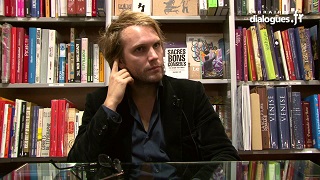
Florian Zeller (Parijs, 28 juni 1979)
De Poolse dichter, vertaler en uitgever Ryszard Krynicki werd geboren op 28 juni 1943 in St.Valentin, Lager Wimberg, Oostenrijk. Zie ook alle tags voor Ryszard Krynicki op dit blog.
Rue de Poitiers
A late afternoon, snow is falling.
Near the striking Musee d’Orsay you see
a grey bundle on the edge of the sidewalk:
a bum rolled up into a ball (or a refugee
from some country plunged in civil war)
still lying on a plaid, wrapped in a blanket,
a salvaged sleeping bag and a right to live.
Yesterday he also had a radio switched on.
Today freezing coins are laid out on the newspaper
in constellations of non-existent planets and moons.
Vertaald door Alissa Valles
The Door
A hollow word, the unpronounceable word: time. You
have not recalled that language on time and have remained
in the door-tree’s shadow. In the woods
of ash, in the ash wilderness,
you have met friends
with the eyes of trees. In the door that opens
features of the face. The woman of the night
embodied you in her. In the forest
of the dead, in the forest of dead languages
your manuscript vanished,
however, you have not retrieved it: this page
of the world, freshly torn out page
was illegible. What remained was
the hollow word: time,
indecipherable page
in the indictment
Vertaald door Ewa Chrusciel
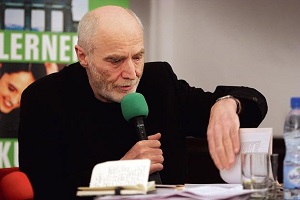
Ryszard Krynicki (St.Valentin, 28 juni 1943)
De Amerikaanse schrijver en journalist Mark Helprin werd geboren in New York op 28 juni 1947. Zie ook alle tags voor Mark Helprin op dit blog.
Uit: A Soldier of the Great War
“When your parents die, Alessandro, you feel that you have betrayed them.”
“Why?” Luciana asked.
“Because you come to love your children more. I lost my mother and father to images in photographs and handwriting on letters, and as I abandoned them for you, the saddest thing was that they made no protest.
“Even now that I’m going back to them, I regret above all that I must leave you.”
“You’re not going back to anybody,” Alessandro told him. “We’ll solve those problems later.”
“Alessandro,” his father said, almost cheerfully. “You don’t understand. This kind of problem is very special: it has no solution.”
(…)
“Young Bindo Altovini, looking out from time, made a perfect coalition with the mountains, the sky, and the tall redheaded woman who had bent over just slightly to examine a raging battle that was long over. Alessandro imagined that Bindo Altovini was saying, half with longing, half with delight, “These are the things in which I was so helplessly caught up, the waves that took me, what I loved. When light filled my eyes and I was restless and could move, I knew not what all the color was about, but only that I had a passion to see. And now that I am still, I pass on to you my liveliness and my life, for you will be taken, as once I was, and although you must fight beyond your capacity to fight and feel beyond your capacity to feel, remember that it ends in perfect peace, and you will be as still and content as am I, for whom centuries are not even seconds.”
In the eyes of Bindo Altoviti, Alessandro saw wisdom and amusement, and he knew why the subjects of paintings and photographs seemed to look from the past as if with clairvoyance. Even brutal and impatient men, when frozen in time, assumed expressions of extraordinary compassion, as if they had reflected the essence of their redemption back into the photograph. In a sense they were still living.”
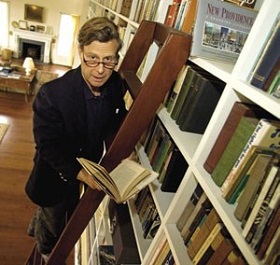
Mark Helprin (New York, 28 juni 1947)
De Oostenrijkse schrijfster Marlene Streeruwitz werd geboren op 28 juni 1950 in Baden bij Wenen. Zie ook alle tags voor Marlene Streeruwitz op dit blog.
Uit: Entfernung
„DieStimme sang. Die Stimme in einem Sprechgesang.
»Lie low little girl. Don’t shut the door.
Let the wolves in. One by one.
Give them cider and cake.
But. Little girl. Don’t forget.
Spike the cider with
Henbane and toad stool
Only dead wolves are dead.
And nothing to dread.«
Und dann nur die Orgel und die Stimme.
»So you don’t get. So you don’t get. So you don’t get.
Crow’s feet and wrinkles. Crow’s feet and wrinkles.
Before you turn 29.
And your life will be over.«
Dann die Wiederholung von »dead wolves are dead.« an.
Die Stimme kaum zu hören. Das Schlagzeug. Die Gitarren.
Noch zwei Gitarristinnen auf der Bühne. Langbeinige Blondinen in Jeans und rot karierten Flanellhemden. Sie standen am hinteren Rand. Die Mick Jagger ähnliche Person. Sie
spielte ein lang gezogenes Solo nach dem anderen. Dann wieder alle. Laut. Dringlich. Selma fand sich im Rhythmus mitwippend. Sie sprang nicht. Wie die anderen. Das wäre mit der Tasche auch gar nicht gegangen. Selma blieb am Rand. An der Wand rechts. Rund um sie die Frauen. Alle konnten die Texte. Sangen im Chor mit. Die Musik hielt alle umfangen.“
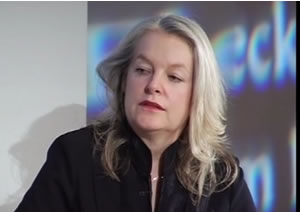
Marlene Streeruwitz (Baden, 28 juni 1950)
De Nederlandse dichteres en schrijfster Fritzi Harmsen van Beek werd geboren in Blaricum op 28 juni 1927. Zie ook alle tags voor Fritzi Harmsen van Beek op dit blog.
De verdoolde kus
Een kus ontsnapte aan een mond
Op Kerstdag in de morgenstond
en zweefde een tijdje of wat voor gek
– want zonder doel – door het vertrek.
Toen leek hem dat op ’t vensterglas
een niet onaardig zitje was.
Hij zàt nog niet of een oud wijf
wou hem met een natte doek te lijf.
Amper ontsnapt aan dit gevaar
Scharrelt hij langs de vloer alwaar
een lelijk monster van een kat
hem bijna bij zijn lurven had.
Verzenuwd en een beetje lam
belandt hij op een boterham
van ’n lieflijk maar vraatzuchtig kind
dat hem per ongeluk háást verslindt.
Maar het tochtje van een ademzucht
jaagt hem nog tijdig op de vlucht
en stuwt hem wild de kamer rond
tot in een boompje dat daar stond.
Daar zaten al een herinnering,
een glimlach en een ander ding
van minder vriendelijk allooi,
maar even goed ook prachtig mooi.
Tussen de takjes, droog en knus
“Hier ga ik wonen”, dacht die kus
en drukte zich innig en voorgoed
volmondig vast, zo rood als bloed.
Men vraagt zich af waar ’t nu aan lag
dat daarna hem geen mens meer zàg.
Stilaan verblekend doofde hij uit –
zonder het geringst geluid – en
nèt als was hij nooit geweest
werd boompje opgetuigd voor feest-
maar kus, onzichtbaar in de top
vrolijkte daar enorm van op.
Want wie wat er wèl is nièt ziet
Deert daarmee zo’n onzichtbare niet,
mits die er maar van uit blijft gaan
dat je ongezien bèst kan bestaan:
Bevend in het zachte licht
peinsde die kus zonder gezicht:
“ ik ben vast een erge lieve zoen
dat ze zo veel moeite voor me doen.
Iets liefs, daar wàs ik toch eigenlijk voor,
gaat helemáál dus niet teloor
als het tot geen Schepsel doordringt. O!
God weet wat ons nog meer omringt.
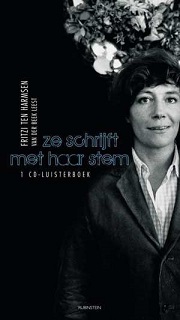
Fritzi Harmsen van Beek (28 juni 1927 – 4 april 2009)
Cover luisterboek
De Italiaanse schrijver Luigi Pirandello werd op 28 juni 1867 geboren in de villa ‘Caos’ (chaos) in de buurt van Agrigento. Zie ook alle tags voor Luigi Pirandello op dit blog.
Uit: The Late Mattia Pascal (Vertaald door Arthur Livingston)
“One of the few things, in fact about the only thing I was sure of was my name: Mattia Pascal. Of this I took full advantage also. Whenever one of my friends or acquaintances so far lost his head as to come and ask me for a bit of advice on some matter of importance, I would shrug my shoulders, squint my eyes, and answer:
“My name is Mattia Pascal!”
“That’s very enlightening, old man! I knew that much already!”
“And you don’t feel lucky to know that much?”
There was no reason why he should that I could see. But at the time I had not realized what it meant not to be sure of even that much—not to be able to answer on occasion, as I had formerly answered:
“My name is Mattia Pascal!”
Some people surely will sympathize with me (sympathy comes cheap) when they try to imagine the immense anguish a poor man must feel on suddenly discovering … well, yes… just a blank; that he knows neither who his father was, nor who his mother was, nor how, nor when, nor where, he was born–if ever he was born at all…. Just as others will be ready to criticize (criticism comes cheaper still) the immorality and viciousness of a society where an innocent child can be treated that way.
Very well! Thanks for the sympathy and the holy horror! But it is my duty to give notice in advance that it’s not quite that way. Indeed, if need should arise, I could give my family tree with the origin and descent of all my house. I could prove that I know my father and my mother, and their fathers and mothers unto several generations, and the doings, through the years, of all those forebears of mine (doings not always to their untarnished credit, I must confess).
Well then?
Well then! It’s this way. My case, not the ordinary one, by any means, is so far out of the ordinary in fact, that I have decided to recount it.”
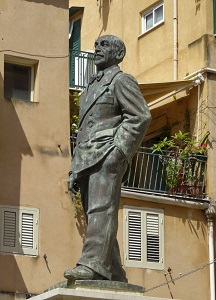
Luigi Pirandello (28 juni 1867 – 10 december 1936)
Standbeeld in Porto Empedocle, Sicilië
De Franse schrijver, filosoof en componist Jean Jacques Rousseau werd geboren in Genève op 28 juni 1712. Zie ook alle tags voor Jean-Jacques Rousseau op dit blog.
Uit: Bekentenissen (Vertaald door Leo van Maris)
“Laat de bazuin van het laatste Oordeel maar schallen, het geeft niet wanneer. Ik zal met dit boek in de hand voor de opperste rechter verschijnen. Ik zal dan luid en duidelijk zeggen: `Zie, dit heb ik gedaan,dit heb ik gedacht, dit ben ik geweest. Met dezelfde openhartigheid heb ik het goede en het kwade verteld. Ik heb niets ongunstigs verzwegen en er niets gunstigs aan toegevoegd en als ik enkele onbelangrijke versieringen heb aangebracht, is dat alleen maar gebeurd om een leemte te vullen die ontstaan was door de ontoereikendheid van mijn geheugen. Ik heb mogelijk iets voor waar aangenomen waarvan ik wist dat het waar geweest kon zijn, nooit iets waarvan ik wist dat het onwaar was. Ik heb mijzelf laten zien zoals ik was, laag en verachtelijk als ik dat geweest ben, goed, edelmoedig en verheven wanneer dat het geval was. Ik heb mijn innerlijk blootgelegd zoals U het zelf hebt gezien. Eeuwig Wezen, verzamel de onmetelijke menigte van mijn medemensen om mij heen. Laat ze mijn bekentenissen horen, laat ze jammeren om mijn schanddaden, laat ze zich schamen voor mijn zwakheden. Laat
ieder van hen op zijn beurt met dezelfde oprechtheid aan de voet van
Uw troon zijn hart blootleggen en laat dan iemand zeggen, als hij durft: “Ik was beter dan deze mens.” Ik ben in 1712 te Genève geboren als zoon van burger Isaac Rousseau en burgeres Suzanne Bernard. Omdat een zeer bescheiden nalatenschap onder vijftien kinderen moest worden verdeeld, bestond mijn vaders aandeel uit bijna niets en had hij als enig middel van bestaan zijn beroep van klokkenmaker, waarin hij overigens heel bedreven was. Mijn moeder, een dochter van de predikant Bernard, bezat meer geld. Ze had ook een goed verstand en was mooi. Mijn vader had haar niet gemakkelijk gekregen. Hun liefde was bijna tegelijk met hun leven begonnen.”
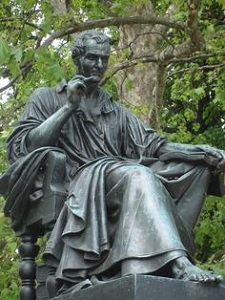
Jean-Jacques Rousseau (28 juni 1712 – 2 juli 1778)
Standbeeld in Genève
De Vlaamse schrijver dichter, vertaler en scenarist Anton van Wilderode (pseudoniem van Cyriel Paul Coupé werd geboren in Moerbeke op 28 juni 1918. Zie ook alle tags voor Anton van Wilderode op dit blog.
Tarquinia 5
De fluitspeler
(Tomba dei Leopardi)
Hij wandelt wijdbeens, mantelpanden wuivend
door het olijfbos, met zeer dikke vingers
over de gaten van de tweefluit schuivend,
de wangen bol, het achterhoofd vol vlinders.
Wat kunnen doden van de krekels horen
die hij doet krijsen in de sarkofagen
in open kruiken kraters en amforen
waar zij versmachten onder sintellagen?
De dag van Eden
In memoriam matris
1
Als ik vanavond thuiskom ben je weg.
Ik zal de tuin inlopen rokend en verdrietig
om al het liefs dat ik je wilde zeggen.
Je zwarte stoel staat in het erwtenbed.
Je zat er vaak tussen twee beurten in
nog met je handen aan de groene lussen
een uur vol gras en vogels uit te rusten,
de druppels zweet al haastig weggewist.
Een fijne sluier zand ligt op je stoel.
Ik zal hem in spiraaltjes openblazen.
Want je bent weg, ik moet mij nooit meer haasten.
Voor hoeveel jaren is dat nu voorgoed.
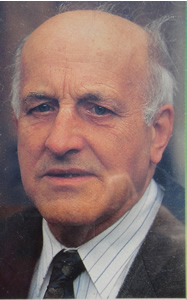
Anton van Wilderode (28 juni 1918 – 15 juni 1998)
Zie voor nog meer schrijvers van de 28e juni ook mijn blog van 28 juni 2014 deel 2.
